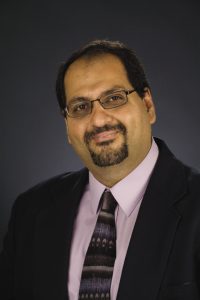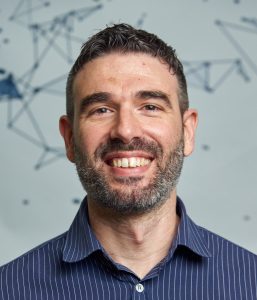Title: AI-EDGE: Designing future XG Networks and Distributed intelligence
 |
Prof. Ness B. Shroff |
Abstract
Networking and AI are two of the most transformative information technologies. These technologies have helped improve the quality of the human condition, contributed to national economic competitiveness, national security, and national defense. The AI-EDGE Institute is aimed at leveraging the synergie between both networking and AI to design the next generation of edge network. A new distributed intelligence plane will be developed to ensure that these networks are self-healing, adaptive, and self-optimized. The future of AI is distributed AI and these intelligent and adaptive networks will in turn unleash the power of collaboration to solve long-standing distributed AI challenges, making AI more efficient, interactive, and privacy preserving. The Institute plans to develop the key underlying technologies for distributed and networked intelligence to enable a host of future transformative applications such as intelligent transportation, remote healthcare, distributed robotics, and smart aerospace. Going beyond research, the Institute recognizes that it is a national priority to educate students, professionals, and practitioners in AI and networks, and substantially grow and diversify the workforce. The Institute will develop novel, efficient, and modular ways of creating and delivering education content and curricula at scale, and to spearhead a program that helps build a large diverse workforce in AI and networks spanning primary and secondary education to university students and faculty. In this talk, the speaker will first give an overview of the key research components of the Institute, identifying a set of research directions and open problems that may be of interest to the broader audience. The speaker will then describe through a case study involving edge-caching, why the edge is so different from the core of the network, and how Machine Learning (ML) tools and techniques can be developed to improve the performance in Edge Networks.
Biography
Ness B. Shroff received his Ph.D. degree from Columbia University, NY in 1994 and joined Purdue university immediately thereafter. At Purdue, he became Professor of the school of Electrical and Computer Engineering and director of CWSA in 2004, a university-wide center on wireless systems and applications. In July 2007, he joined the ECE and CSE departments at The Ohio State University, where he holds the Ohio Eminent Scholar Chaired Professorship of Networking and Communications. From 2009-2012, he also served as a Guest Chaired professor of Wireless Communications at Tsinghua University, Beijing, China, and an Honorary Guest Professor at Shanghai Jiatong University. He is a visiting professor at the Indian Institute of Technology, Bombay. He currently serves as the Principal Investigator and Institute Director of the NSF AI Institute on Future Edge Networks and Distributed Intelligence (ai-edge.osu.edu). Dr. Shroff’s research focuses on fundamental problems in machine learning, network optimization, stochastic control, and algorithmic design. Dr. Shroff is a Fellow of the IEEE, and a National Science Foundation CAREER awardee. He has received numerous best paper awards and has been on the list of highly cited researchers from Thomson Reuters ISI (previously ISI web of Science) in 2014 and 2015, and in Thomson Reuters Book on The World’s Most Influential Scientific Minds in 2014. He received the IEEE INFOCOM achievement award for seminal contributions to scheduling and resource allocation in wireless networks, in 2014.
Title: AI meets network requirements
 |
Dr. Marco Fiore IMDEA Networks Institute, Madrid, Spain Net AI, Edinburgh, UK |
Abstract
Artificial intelligence (AI) has permeated research in many scientific domains, and networking is no exception: machine learning is widely considered instrumental to the automation of network operation, and a vast related literature has emerged in recent years. Yet, networks do represent an exception when it comes to the unique requirements they impose to AI. Meeting these specifications is crucial to the viability and performance of AI-driven networking, and calls for a careful and dedicated design of machine learning models. In this talk, I will discuss challenges related to latency, computing and performance, and provide examples of how the integration of AI in network systems often requires advancing the state of the art in machine learning.
Biography
Marco Fiore is a Research Professor at IMDEA Networks Institute, Spain, and a co-founder and CTO at Net AI, a UK-based network intelligence company. He received MSc degrees from University of Illinois at Chicago, USA, and Politecnico of Torino, Italy, a PhD degree from Politecnico di Torino, Italy, and a Habilitation à Diriger des Recherches (HDR) from Université de Lyon, France. Marco has been a Maître de Conférences (Associate Professor) at Institut National des Sciences Appliquées (INSA) de Lyon, France, Associate Researcher at Inria, France, Researcher at Consiglio Nazionale delle Ricerche, Italy, and visiting researcher at Rice University, USA, Universitat Politècnica de Catalunya, Spain, and University College London, UK. He is a former Marie Curie fellow and Royal Society visiting research fellow, and he is a Senior Member of IEEE, and a Member of ACM. Marco’s research interests are at the interface of mobile networks and data science.
